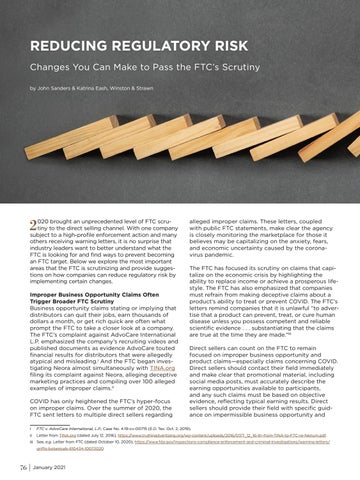REDUCING REGULATORY RISK Changes You Can Make to Pass the FTC’s Scrutiny by John Sanders & Katrina Eash, Winston & Strawn
2
020 brought an unprecedented level of FTC scrutiny to the direct selling channel. With one company subject to a high-profile enforcement action and many others receiving warning letters, it is no surprise that industry leaders want to better understand what the FTC is looking for and find ways to prevent becoming an FTC target. Below we explore the most important areas that the FTC is scrutinizing and provide suggestions on how companies can reduce regulatory risk by implementing certain changes. Improper Business Opportunity Claims Often Trigger Broader FTC Scrutiny Business opportunity claims stating or implying that distributors can quit their jobs, earn thousands of dollars a month, or get rich quick are often what prompt the FTC to take a closer look at a company. The FTC’s complaint against AdvoCare International L.P. emphasized the company’s recruiting videos and published documents as evidence AdvoCare touted financial results for distributors that were allegedly atypical and misleading.i And the FTC began investigating Neora almost simultaneously with TINA.org filing its complaint against Neora, alleging deceptive marketing practices and compiling over 100 alleged examples of improper claims.ii COVID has only heightened the FTC’s hyper-focus on improper claims. Over the summer of 2020, the FTC sent letters to multiple direct sellers regarding i
alleged improper claims. These letters, coupled with public FTC statements, make clear the agency is closely monitoring the marketplace for those it believes may be capitalizing on the anxiety, fears, and economic uncertainty caused by the coronavirus pandemic. The FTC has focused its scrutiny on claims that capitalize on the economic crisis by highlighting the ability to replace income or achieve a prosperous lifestyle. The FTC has also emphasized that companies must refrain from making deceptive claims about a product’s ability to treat or prevent COVID. The FTC’s letters remind companies that it is unlawful “to advertise that a product can prevent, treat, or cure human disease unless you possess competent and reliable scientific evidence . . . substantiating that the claims are true at the time they are made.”iii Direct sellers can count on the FTC to remain focused on improper business opportunity and product claims—especially claims concerning COVID. Direct sellers should contact their field immediately and make clear that promotional material, including social media posts, must accurately describe the earning opportunities available to participants, and any such claims must be based on objective evidence, reflecting typical earning results. Direct sellers should provide their field with specific guidance on impermissible business opportunity and
FTC v. AdvoCare International, L.P., Case No. 4:19-cv-00715 (E.D. Tex. Oct. 2, 2019).
ii Letter from TINA.org (dated July 12, 2016), https://www.truthinadvertising.org/wp-content/uploads/2016/07/7_12_16-ltr-from-TINA-to-FTC-re-Nerium.pdf. iii See, e.g. Letter from FTC (dated October 10, 2020), https://www.fda.gov/inspections-compliance-enforcement-and-criminal-investigations/warning-letters/ griffo-botanicals-610434-10072020
76
January 2021
